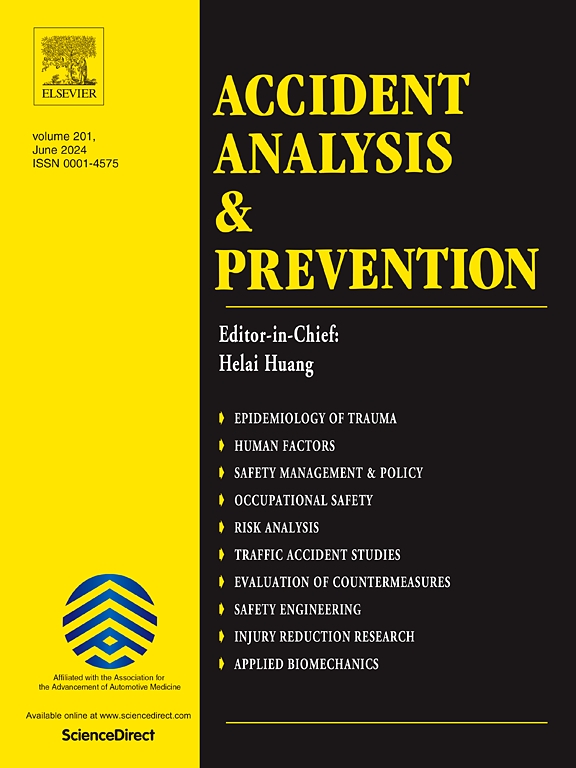Decision-making of autonomous vehicles in interactions with jaywalkers: A risk-aware deep reinforcement learning approach
IF 5.7
1区 工程技术
Q1 ERGONOMICS
引用次数: 0
Abstract
Jaywalking, as a hazardous crossing behavior, leaves little time for drivers to anticipate and respond promptly, resulting in high crossing risks. The prevalence of Autonomous Vehicle (AV) technologies has offered new solutions for mitigating jaywalking risks. In this study, we propose a risk-aware deep reinforcement learning (DRL) approach for AVs to make decisions safely and efficiently in jaywalker-vehicle interactions. Notably, a risk prediction module is incorporated into the traditional DRL framework, making the AV agent risk-aware. Considering the complexity of jaywalker-vehicle conflicts, an encoder-decoder model is adopted as the risk prediction module, which comprehensively integrates multi-source data and predicts probabilities of the final conflict severity levels. The risk-aware DRL approach is applied in a simulated environment established in Anylogic, where the motion features of jaywalkers and vehicles are calibrated using real-world survey data.
The trained driving policies are evaluated from perspectives of safety and efficiency across three scenarios with escalading levels of jaywalker volume. Regarding safety performance, the Baseline policy performs the worst in “medium jaywalker volume” scenario and “high jaywalker volume” scenario, while our Proposed risk-aware method outperforms the other methods, with the “low TTC ratio” metric stabilizing near 0.08. Moreover, as the scenario gets more complex, the superiority of our Proposed risk-aware policy gets more evident. In terms of efficiency performance, our Proposed risk-aware policy ranks the second best, achieving an “AV delay” metric around 8.1 s in the “medium jaywalker volume” scenario and 8.5 s in the “high jaywalker volume” scenario. In practice, the proposed risk-aware DRL approach can help AV agents perceive potential risks in advance and navigate through potential jaywalking areas safely and efficiently, further enhancing pedestrian safety.
自动驾驶汽车在与乱穿马路者互动时的决策制定:风险感知深度强化学习方法。
乱穿马路是一种危险的过马路行为,驾驶员几乎没有时间作出预测和及时反应,因此过马路的风险很高。自动驾驶汽车(AV)技术的普及为降低乱穿马路风险提供了新的解决方案。在本研究中,我们提出了一种风险感知深度强化学习(DRL)方法,让自动驾驶汽车在乱穿马路者与车辆的互动中安全高效地做出决策。值得注意的是,在传统的 DRL 框架中加入了风险预测模块,使 AV 代理具有风险意识。考虑到乱穿马路者与车辆冲突的复杂性,风险预测模块采用了编码器-解码器模型,全面整合多源数据,预测最终冲突严重程度的概率。在 Anylogic 中建立的模拟环境中应用了风险感知 DRL 方法,利用真实世界的调查数据校准了乱穿马路者和车辆的运动特征。从安全和效率的角度评估了三种场景下经过训练的驾驶策略,这些场景中的乱穿马路者数量不断增加。在安全性能方面,基准策略在 "中等乱穿马路者数量 "和 "高乱穿马路者数量 "场景中表现最差,而我们提出的风险感知方法则优于其他方法,"低 TTC 比率 "指标稳定在 0.08 附近。此外,随着场景越来越复杂,我们提出的风险感知策略的优越性也越来越明显。在效率表现方面,我们提出的风险感知策略排名第二,在 "中等乱穿马路者数量 "场景下,"AV 延迟 "指标约为 8.1 秒,在 "高乱穿马路者数量 "场景下约为 8.5 秒。在实际应用中,建议的风险感知 DRL 方法可帮助自动驾驶汽车提前感知潜在风险,并安全高效地通过潜在乱穿马路区域,从而进一步提高行人安全。
本文章由计算机程序翻译,如有差异,请以英文原文为准。
求助全文
约1分钟内获得全文
求助全文
来源期刊

Accident; analysis and prevention
Multiple-
CiteScore
11.90
自引率
16.90%
发文量
264
审稿时长
48 days
期刊介绍:
Accident Analysis & Prevention provides wide coverage of the general areas relating to accidental injury and damage, including the pre-injury and immediate post-injury phases. Published papers deal with medical, legal, economic, educational, behavioral, theoretical or empirical aspects of transportation accidents, as well as with accidents at other sites. Selected topics within the scope of the Journal may include: studies of human, environmental and vehicular factors influencing the occurrence, type and severity of accidents and injury; the design, implementation and evaluation of countermeasures; biomechanics of impact and human tolerance limits to injury; modelling and statistical analysis of accident data; policy, planning and decision-making in safety.
 求助内容:
求助内容: 应助结果提醒方式:
应助结果提醒方式:


